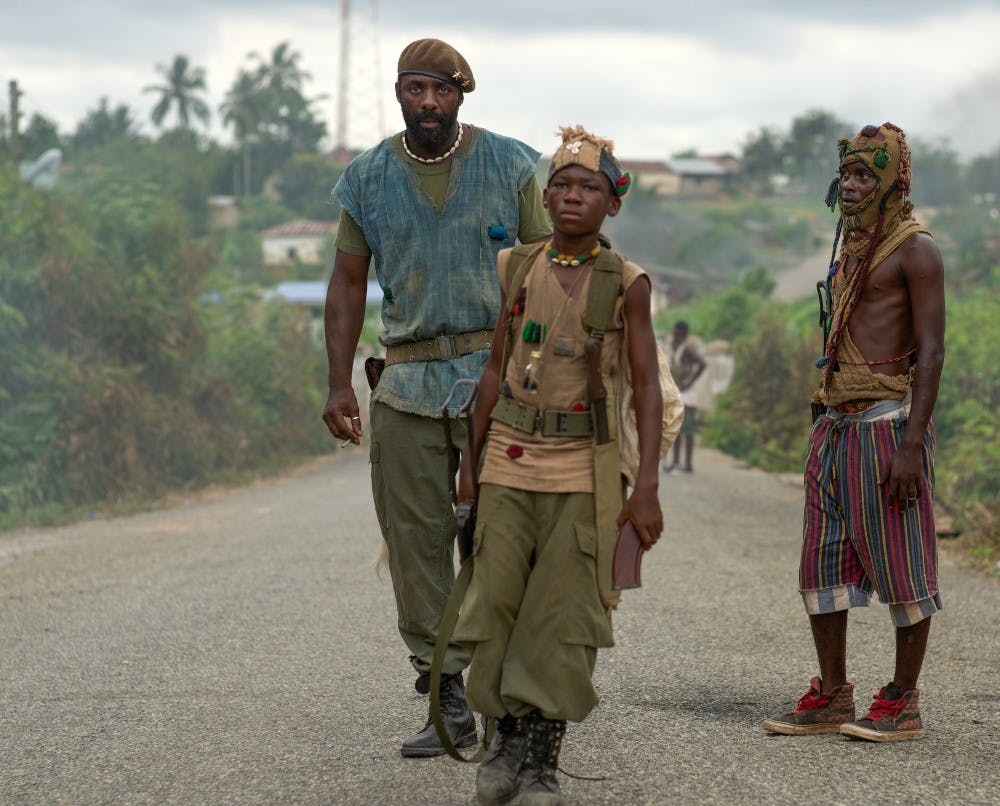“Beasts of No Nation” plays out like a cold and distant nightmare that is jarringly alive and visceral. Netflix may be the new kids on the block when it comes to distributing films, this being its first, but if the rest of their selections rival the quality of “Beasts” then we may be looking at the rise of a dynasty.
Director, cinematographer and screenwriter Cary Fukunaga has created a masterpiece that is in equal parts beautiful and horrific. Every risk that Fukunaga takes pays off. “Beasts of No Nation” is bold on all fronts and transcends tears. Instead, it left me covering my face in fear and verbally comforting myself through its horrors. “Beasts of No Nation” isn’t something that can be shaken off or easily forgotten.
Agu (Abraham Attah) is a nine-year-old boy who lives with his family in a village that acts as a buffer zone between two warring countries.The war interrupts life in the village as the townspeople are needed to assist refugees and aid the UN officers keeping the peace. Agu and the other children live mostly normal lives: They run, they play and they trick.
However, the war rapidly trickles into the village and Agu’s family is split up, leaving him alone in the tumultuous climate. He stays hidden for many days until he is found by a battalion of young soldiers. Leading the soldiers is the fiery, ruthless Commandant (Idris Elba) who takes Agu under his own wings for training.
Fukunga wisely balances the bleak, cold story with vivacious and stunning imagery. He stunningly paints the deserts and forest of West Africa with an immense amount of color and lushness. During the middle of the second act, when Commandant’s battalion is invading a village, Fukunaga ventures into the surreal with one of the most stunning visual moments of the year.
The green drains out and the forest turns to fuchsia; the trees look like the Japanese sakura in bloom. Agu looks to his right and imagines a collection of masked and painted individual stalking through the tall grass as the troop ravages the nearby village. Commandant screams, “Spare nobody. Kill them all.” The tint, slow motion and music are woozy and daydreamish, but when Agu comes to the actuality is even more horrific.
Elba is as stunning as usual and elevates the complexities of the war leader who brutally battles the enemies but takes on the role of a father for the boys whose innocence he has stolen. Elba is spookily convincing, and for seconds at a time the audience is forced to believe that what he is doing could be what the war has driven him to. Ultimately, his ruthlessness prevails.
On the other hand, Attah is the heart of the movie and puts on one of the best male performances of the decade. Everything from his voice, body language and eyes are mannered and in fine form. Agu’s narration throughout the film is rivaled only by Terrence Malick's "Tree of Life" in effectiveness. Agu’s wonderment, disgust and loss of self is all fully realized by Attah just through his voice.
The entire performance is a masterclass in subtle acting and how much weight could be carried in a child’s eyes. Attah must have gone to some real dark places to perform with so much authenticity in his acting debut.
“Beasts of No Nation” follows through the horrors of the soldiers sporadically, so it relies on experience rather than plot points. In fact, “Beasts” has a lot in common with László Nemes directorial debut “Son of Saul” a masterful, first-person Holocaust film due out later this year. Nothing can prepare you for either film and both transcend what it is like to watch a story play out, like “Apocalypse Now” did in 1972.
The harrowing violence and emotional trauma that “Beasts” portrays never becomes redundant or anything less than shocking. The tension and intensity build until the epilogue, which was a punch in the gut that left me winded.
Related Links:
'Steve Jobs' is stylish and innovative, but Sorkin needs a software upgrade
Reach the reporter at tanner.stechnij@asu.edu or follow @tannerstechnij on Twitter.
Like The State Press on Facebook and follow @statepress on Twitter.




